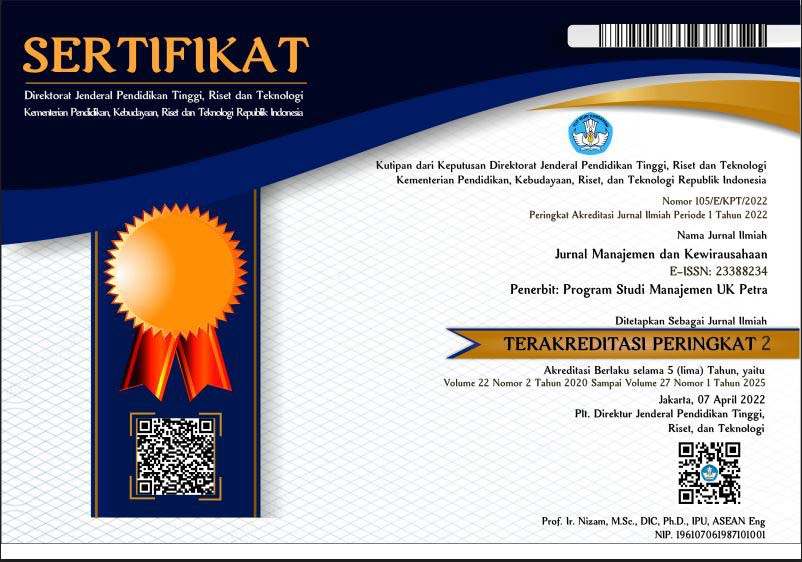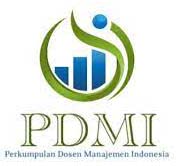THE ROLES OF KNOWLEDGE SHARING IN MEDIATING THE EFFECT OF SELF-EFFICACY AND SELF-LEADERSHIP TOWARD INNOVATIVE BEHAVIOR
 :
:
https://doi.org/10.9744/jmk.19.2.112-117
Keywords:
Self-efficacy, self-leadership, knowledge sharing, innovative behavior.Abstract
This research is to investigate the correlation between self-efficacy, self-leadership, and knowledge sharing as observed in the innovative behavior of Endek weaving small enterprise in Bali. Innovation is an interesting issue in SMEs, due to its sustainability efforts of the business. Endek weaving is one unique product that has social and economic value. The unit of analysis is Endek weaving small enterprise in Klungkung, a regency located in the east area of Bali, as it is the center production of Endek weaving in Bali area. The number of respondents is 96 employees of Endek weaving companies in Klungkung Regency. Data analysis method in this research is using the quantitative approach with the tool of Structure Equation Model Partial Least Square (SEM PLS). The results show that self-efficacy and self-leadership have significant influences to knowledge sharing. Self-efficacy has an insignificant influence on innovative behavior, while self-leadership has a significant influence on innovative behavior. Knowledge sharing has a significant influence on innovative behavior. An important finding of this research is knowledge sharing as a mediator of self-efficacy to innovative behavior.References
Abdallah, S., Khalil, & Divine, A. (2012). The impact of knowledge sharing on innovation capability in United Arab Emirates organizations. International Journal of Social, Behavioral, Educational, Economic, Business and Industrial Engineering, 6(12). [CrossRef]
Alhady, S. M., Idris A. S. A., Sawal, M. Z., & Azmi, A. A. (2011). Knowledge sharing behavior and individual factors: A relationship study in the I-Class environment. International Conference on Management and Artificial Intelligence (IPED) 6, IACSIT Press, Bali, Indonesia, 137–141. [CrossRef]
Bandura, A. (1982). Self efficacy mechanism in human agency. American Psychologist, 37(2), 122–147. [CrossRef]
-------------- (1986). Social foundations of thought and action: A social cognitive theory. Englewood Cliffs, NJ: Prentice-Hall. [CrossRef]
Begonja, M., Cicek, F., Balboni, B., & Gerbin, A. (2016). Innovation and business performance determinants of smes in the adriatic region that social innovation. Economic Research Ekonomska Istrazivanja, 29(1), 1136–1149. [CrossRef]
Bradshaw, R., Chebbi, M., & Oztel, M. (2015). Leadership and knowledge sharing. Asian Journal of Business Research, 5(1), 1–20. [CrossRef]
Carmeli, A. (2006). Self leadership skills and innovative behavior at work. International Journal of Manpower, 27(1), 75–90. [CrossRef]
Carmeli, A., Weisberg, J., & Meiter, R. (2006). Self leadership skills and innovative behavior at work. International Journal of Manpower, 27 (1), 75–90. [CrossRef]
Crossan, M. M. & Apaydin, M. (2010). A multidimensional framework of organizational innovation: A systematic review of the literature. Journal of Management Studies, 47(6), 1154–1191. [CrossRef]
Gomes, C., Curral, L., Caetano, A., & Quinteiro, P. M. (2015). Better off together: A cluster analysis of selfleadership and its relationship to individual innovation in hospital nurses. Revista Psicologia, 29(1), 45–58. [CrossRef]
Hilmi, Faiz, M., Ramayah, T., & Mustapha, Y. (2011). Product and process innovativeness: Evidence from Malaysian smes. European Journal of Social Sciences, 16(4), 547–555. [CrossRef]
Hoof, B. V. & Weenen, V. (2004). Committed to sharing commitment and CMC use as antecedents of knowledge sharing. Knowledge and Process Management, 11, 13–24. [CrossRef]
Hosseini, S. A., Bathae, S. M., & Mohammadzadeh, S. (2014). Does selfefficacy effect on knowledge sharing intention in e-learning system? A motivational factor analysis in Open University Malaysia (OUM). Kuwait Chapter of Arabian Journal of Business and Management Review 3(11) 35–46. [CrossRef]
Hsiao, Y. P., Brouns, F., Bruggen, J. V., & Sloep, P. B. (2012). Effects of peertutor competencies on learner cognitive load and learning performance during knowledge sharing. IADIS International Conference on Cognition and Exploratory Learning in Digital Age, 265–268. [CrossRef]
Hsiao, H. C., Chang, J. C., Tu, Y. L., & Chen, S. C. (2011). The Impact of selfefficacy on innovative work behavior for teacher. International Journal of Social Science and Humanity, 1(1), 31–36. [CrossRef]
Hsu, M. L. A., Tsunghou, S., & Liangfan, H. (2011). Creative selfefficacy and innovative behavior in a service setting: optimism as a mediator. Journal of Creative Behavior, 45(4), 258–272. [CrossRef]
Igbaria, M. & Iivari, J. (1995). The effects of selfefficacy on computer usage omega, 23(6), 587–605. [CrossRef]
Jimenez, D. & SanzValle, R. (2011). Innovation, organizational learning, and performance. Journal of Business Research, 64(4), 408–417. [CrossRef]
Karadag, H. (2016). The role of SMEs and entrepreneurship on economic growth in emerging economies within the postcrisis era: An analysis from Turkey. Journal on Small Business and Entrepreneurship Development, 4(1), 22–31. [CrossRef]
Khodaverdi, Y. (2015). The study of relationship between technological innovation management, organizational atmosphere and selfleadership on innovation process, innovation performance and activeties. Indian Journal of Fundamental and Applied Life Science, 5(2), 440–448. [CrossRef]
Kor, B. (2016). The mediating effect of selfleadership on perceived entrepreneurial orientation and innovative work behavior in the banking sector. Springer Plus, 5, 45–58. [CrossRef]
Lin, H. F. (2007). Knowledge Sharing and firm innovation capability: An empirical study. International Journal of Manpower 28, 315–332. [CrossRef]
Madanchian, M., Hussein, N., & Noordin, F. (2015). The role of smes in economic development case study of Malaysia. International Journal of Economic Research in Management, 4(3), 77–84. [CrossRef]
Manz, C. C. (1986). Selfleadership: Toward an expanded theory of selfinfluence processes in organization. Academy of Management Review, 11, 585–600. [CrossRef]
Manz, C. C. & Neck, C. P. (2004). Mastering selfleadership: Empowering yourself for personal excellence. Pearson/PrenticeHall. Upper Saddle River, NJ. [CrossRef]
Masood, K., Shahzad, C., & Nosheen, R. (2011). Effects of selfleadership knowledge management and culture on creativity. European Journal of Business and Management, 3(8), 1–12. [CrossRef]
Momeni, M., Ebrahimpour, H., & Ajirloo, M. B. (2014). The effect of employees selfefficacy on innovative work behavior at social security organization employees in Ardabil province. Kuwait chapter Arabian Journal of Business and Management Review, 3(8), 29–32. [CrossRef]
Nonaka, I. & Takeuchi, H. (1995). The knowledgecreating company. New York: Oxford University Press. [CrossRef]
Oduntan, K. O. (2014). The role of small and medium enterprises in economic development: The Nigerian experience. International Conference Art Economic and Management, 75–80. [CrossRef]
Ofori, D., Osei, A., Mensah, S. A., & Affum, E. K. (2015). Innovation and knowledge sharing: A new competitive advantage in the mobile telecommunication industry in Ghana. Science Journal of Business and Management, 3(5), 157–163. [CrossRef]
Olowodunoye, S. A. (2015). Knowledge sharing behavior: The role of selfefficacy, organizational justice and organizational tenure. European Scientific Journal, 11(17), 254–264. [CrossRef]
Omar, I. N. & Mahmud, N. (2014). Effect of behavioral, cognitive and physiological strategies of self leadership on innovative work behavior. Australian Journal of Basic and Applied Sciences, 8(23), 95–100. [CrossRef]
Omri, W. (2015). Innovative behavior and venture performance of SMEs: The moderating effect of environmental dynamism. European Journal of Innovation Management, 18(2), 195–217. [CrossRef]
Park, G. R., Moon, G. W., Hyun, S. E. (2014). An impact of self leadership on innovative behavior in sports educators and understanding of advanced research. The SIJ Transactions on Industrial, Financial & Business Management, 2(3), 117–122. [CrossRef]
Scumpeter, J. (1934). The theory of economics development. Cambridge, MA: Harvard University Press. [CrossRef]
Shaari, R., Rahman, S. A. A., & Rajab, A. (2014). Selfefficacy as a determined factor for knowledge sharing awareness. International Journal of Trade, Economics, and Finance, 5(1), 39–42. [CrossRef]
Tasan, S. B. (2013). The influences of participative organizational climate and selfleadership on innovative behavior and the roles of job involvement and proactive personality: A survey in the context of smes in Izmir 2nd International Conference on Leadership, Technology and Innovation Management. ProcediaSocial and Behavioral Sciences 75, 407–419. [CrossRef]
Van Den Hooff, V .D. B. & De Ridder, J. A. (2004), Knowledge sharing in context: The influence of organizational commitment, communication climate and cmc usage on knowledge sharing. Journal of Knowledge Management, 8(6), 117–130. [CrossRef]
Widyani, D. A. A. (2016). Peran mediasi absorption capacity: pengaruh knowledge sharing terhadap inovasi pada koperasi di wilayah Denpasar Selatan. Abstrak Seminar Nasional, Inovasi Ipteks Perguruan Tinggi Untuk Meningkatkan Kesejahteraan Masyarakat, 2, 125. [CrossRef]
Widyani, D. A. A., Sugianingrat, I. A. W., & Sarmawa, I. W. G. (2016). Peran Entrepreneurial Orientation dalam memediasi selfleadership dan innovation behavior pada karyawan Endek weaving di Klungkung Bali. Seminar Nasional Hasil Penelitian; Prosiding Meningkatkan Mutu Penelitian dan Peringkat Perguruan Tinggi, 1–6. [CrossRef]
Yonica, O. (2013). The impact of innovation in Romaniance small and medium sized enterprises on economic growth development. Journal of Knowledge Management, Economics and Information Technology, 409–423. [CrossRef]
Yu, C., Fang, T., & Chieh, C. (2013). Knowledge sharing, organizational climate, and innovative behavior: A crosslevel analysis of effects. Social behavior and personality, 41(1), 143–156. [CrossRef]
Ziyae, B. & Heydari, R. (2016). Investigating the effect of selfleadership on entrepreneurs’ innovation in small and medium sized enterprises. International Journal of Humanities and Cultural Studies, 2(4), 1169–1182. [CrossRef]
Downloads
Published
How to Cite
Issue
Section
License
Authors who publish on this journal agree to the following terms:
- Authors retain copyright and grant the journal right of first publication with the work simultaneously licensed under a Creative Commons Attribution License that allows others to share the work with an acknowledgement of the work's authorship and initial publication in this journal.
- Authors are able to enter into separate, additional contractual arrangements for the non-exclusive distribution of the journal's published version of the work (e.g., post it to an institutional repository or publish it in a book), with an acknowledgement of its initial publication in this journal.
- Authors are permitted and encouraged to post their work online (e.g., in institutional repositories or on their website) prior to and during the submission process, as it can lead to productive exchanges, as well as earlier and greater citation of published work (See The Effect of Open Access).

















